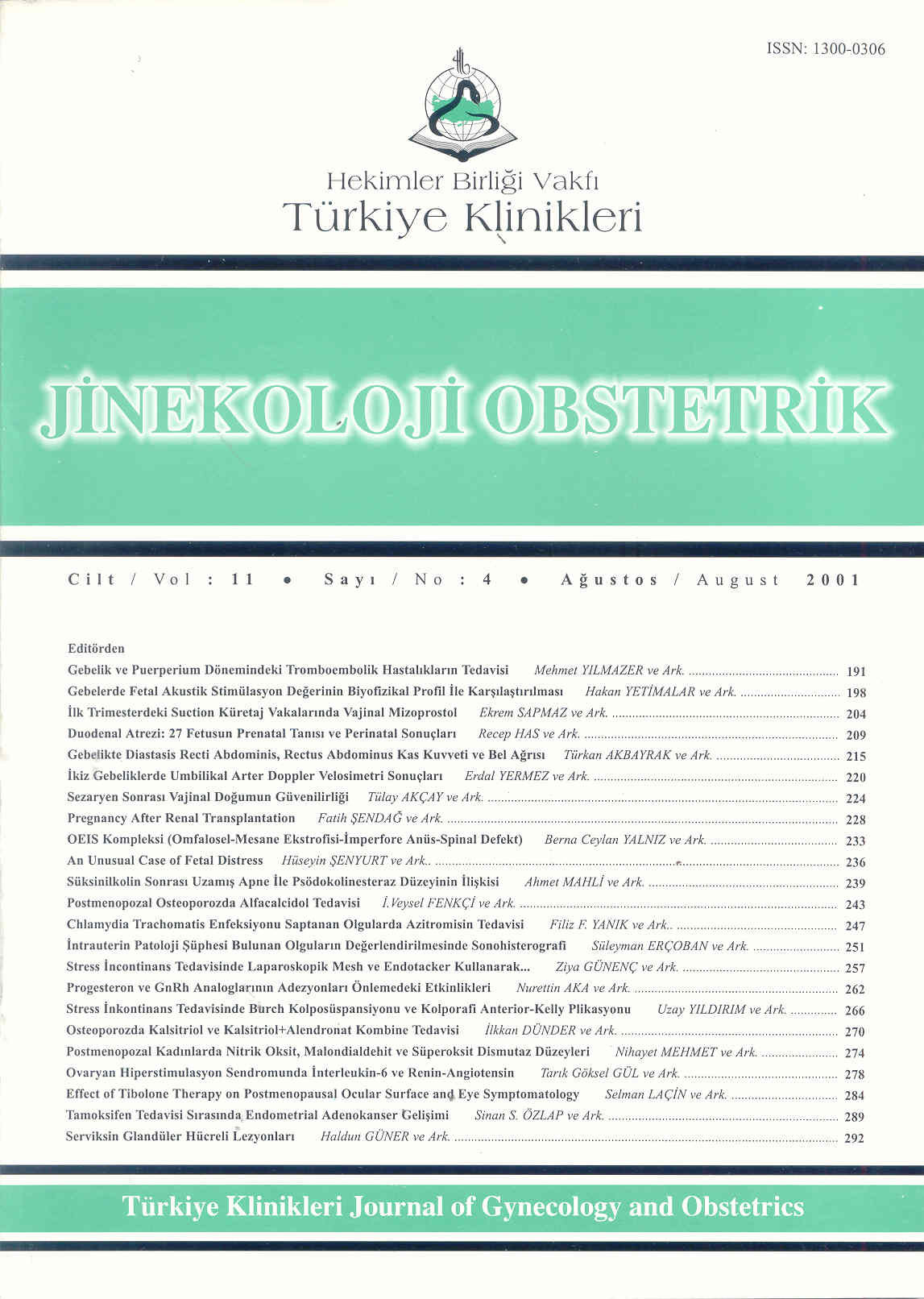Open Access
Peer Reviewed
ARTICLES
8983 Viewed3893 Downloaded
Azithromycin Therapy in Cases with Chlamydia Trachomatis Infection
Chlamydia Trachomatis Enfeksiyonu Saptanan Olgularda Azitromisin Tedavisi
Turkiye Klinikleri J Gynecol Obst. 2001;11(4):247-50
Article Language: TR
Copyright Ⓒ 2025 by Türkiye Klinikleri. This is an open access article under the CC BY-NC-ND license (http://creativecommons.org/licenses/by-nc-nd/4.0/)
ÖZET
Amaç: Vajinal akıntı yakınması ile başvuran ve Chlamydia trachomatis enfeksiyonu saptanan olgularda azitromisin tedavisinin başarısının değerlendirilmesi. Çalışmanın yapıldığı yer: Ondokuz Mayıs Üniversitesi Tıp Fakültesi Hastanesi. Materyel ve Metod: Polikliniğe vajinal akıntı yakınması ile başvuran reprodüktif çağda ve seksüel olarak aktif hastalarda endoservikal örneklerde ELISA yöntemi ile C.trachomatis taraması yapıldı. Enfeksiyon saptanan 24 hastada tek doz 1000 mg azitromisin tedavisi uygulandı. Üç hafta sonraki kontrollerde ELISA testi tekrarlanarak tedavi sonuçları değerlendirildi. Bulgular: Azitromisin tedavisi sonrasında 16 hastada akıntı yakınmasının kaybolduğu (%66,6) ve 7 hastada da akıntıda azalma olduğu öğrenildi (%29,2). Toplam 24 olgunun 20sinde ELISA testinin negatifleştiği görüldü (%83,3). Olguların hiçbirinde tedaviye bağlı gastrointestinal yakınmalar olmadı. Sonuç: Azitromisin, tek doz kullanım kolaylığı ve yan etki insidansının oldukça düşük olması gibi avantajlarından dolayı komplike olmayan genital C.trachomatis enfeksiyonlarının tedavisinde tercih edilebilir.
Amaç: Vajinal akıntı yakınması ile başvuran ve Chlamydia trachomatis enfeksiyonu saptanan olgularda azitromisin tedavisinin başarısının değerlendirilmesi. Çalışmanın yapıldığı yer: Ondokuz Mayıs Üniversitesi Tıp Fakültesi Hastanesi. Materyel ve Metod: Polikliniğe vajinal akıntı yakınması ile başvuran reprodüktif çağda ve seksüel olarak aktif hastalarda endoservikal örneklerde ELISA yöntemi ile C.trachomatis taraması yapıldı. Enfeksiyon saptanan 24 hastada tek doz 1000 mg azitromisin tedavisi uygulandı. Üç hafta sonraki kontrollerde ELISA testi tekrarlanarak tedavi sonuçları değerlendirildi. Bulgular: Azitromisin tedavisi sonrasında 16 hastada akıntı yakınmasının kaybolduğu (%66,6) ve 7 hastada da akıntıda azalma olduğu öğrenildi (%29,2). Toplam 24 olgunun 20sinde ELISA testinin negatifleştiği görüldü (%83,3). Olguların hiçbirinde tedaviye bağlı gastrointestinal yakınmalar olmadı. Sonuç: Azitromisin, tek doz kullanım kolaylığı ve yan etki insidansının oldukça düşük olması gibi avantajlarından dolayı komplike olmayan genital C.trachomatis enfeksiyonlarının tedavisinde tercih edilebilir.
ANAHTAR KELİMELER: Chlamydia trachomatis, Servisit, Azitromisin
ABSTRACT
Objective: Evaluation of azithromycin therapy in patients with genital Chlamydia trachomatis infection and attended with the complaint of vaginal discharge. Institution: Ondokuz Mayıs University Hospital. Materials and Methods: Endocervical samples were obtained from sexually active women in the reproductive age group who attended the outpatient clinic with the complaint of vaginal discharge; and ELISA test was performed for the detection of C.trachomatis infection. Test-positive 24 patients were treated with single dose 1000 mg of azithromycin. Three weeks later in the control visit, ELISA test was performed again and the treatment results were evaluated. Results: After the treatment, vaginal discharge has disappeared in 16 patients (66.6%) and decreased in 7 patients (29.2%). ELISA test results were negative in 20 out of 24 patients (83.3%). None of the patients complained of gastrointestinal side-effects related to the azithromycin therapy. Conclusion: Azithromycin may be preferred in the treatment of uncomplicated genital C.trachomatis infections because of its advantage of single dose treatment and low incidence of side-effects.
Objective: Evaluation of azithromycin therapy in patients with genital Chlamydia trachomatis infection and attended with the complaint of vaginal discharge. Institution: Ondokuz Mayıs University Hospital. Materials and Methods: Endocervical samples were obtained from sexually active women in the reproductive age group who attended the outpatient clinic with the complaint of vaginal discharge; and ELISA test was performed for the detection of C.trachomatis infection. Test-positive 24 patients were treated with single dose 1000 mg of azithromycin. Three weeks later in the control visit, ELISA test was performed again and the treatment results were evaluated. Results: After the treatment, vaginal discharge has disappeared in 16 patients (66.6%) and decreased in 7 patients (29.2%). ELISA test results were negative in 20 out of 24 patients (83.3%). None of the patients complained of gastrointestinal side-effects related to the azithromycin therapy. Conclusion: Azithromycin may be preferred in the treatment of uncomplicated genital C.trachomatis infections because of its advantage of single dose treatment and low incidence of side-effects.
MENU
POPULAR ARTICLES
MOST DOWNLOADED ARTICLES





This journal is licensed under a Creative Commons Attribution-NonCommercial-NoDerivatives 4.0 International License.










